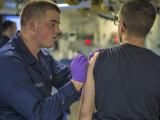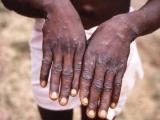Dec 20, 2002 (CIDRAP News) – A new national survey suggests that most Americans have serious misconceptions about smallpox, including a belief that smallpox cases have occurred in the past 5 years and that smallpox is treatable.
Close to two-thirds of the respondents said they think smallpox vaccine should be made available to the public now. But 25% said vaccination would likely be fatal, and a large majority said they would not want to be vaccinated if they heard that their own doctor and many other doctors refused the shot.
"This survey revealed substantial misinformation among Americans about smallpox and smallpox vaccination," states the report by Robert J. Blendon, ScD, of the Harvard School of Public Health, and colleagues. The report was one of several smallpox articles published online yesterday by the New England Journal of Medicine; the articles will be published in print form in the Jan 30, 2003, issue.
The poll was a 61-question telephone survey conducted between Oct 8 and Dec 8; it was completed by 1,006 adults and had a margin of sampling error of 3.1 percentage points.
Questions about the disease revealed the following:
- 64% of respondents believed a smallpox attack would be likely if the United States attacked Iraq
- 63% thought smallpox cases had occurred in the world in the past 5 years, and 30% believed cases had occurred in the United States in that time
- 78% said there is effective medical treatment for smallpox
- 67% thought they would be very or somewhat likely to contract smallpox if they came within a few feet of a person with the disease
- 87% said they would be somewhat or very likely to survive if they contracted smallpox
Questions about smallpox vaccine yielded the following findings:
- 46% of those who had had a smallpox shot thought they would be protected from serious illness if there were an outbreak now
- 42% said that vaccination within a few days after exposure to smallpox would protect a person (experts say a shot within 2 to 3 days after exposure would be protective)
- 25% thought the vaccine would be somewhat or very likely to cause death (the actual risk is estimated to be 1 or 2 in a million)
- 65% said vaccine should be available to the public now on a voluntary basis
- 61% would get a shot if it were offered as a precaution against terrorist attack
- 88% would get a shot if smallpox were reported in their community
- Only 21% would be vaccinated if they heard that their physician and many others were refusing the shot
Questions about possible responses to a smallpox attack showed support for quarantine and other public health measures to contain the disease. For example:
- 95% said they would agree to be quarantined for 2 to 3 weeks if they were exposed to smallpox but had no symptoms
- 77% would agreed to be isolated for 3 to 4 weeks if they contracted smallpox
- 73% favored isolation for smallpox patients in a special health facility, with the possibility of arrest for those who refused
- 73% supported quarantining people suspected of having been exposed
- 67% favored authorizing state governors to use troops to prevent people from leaving communities with smallpox outbreaks
Blendon RJ, DesRoches CR, JM Benson, et al. The public and the smallpox threat. N Engl J Med 2002 Jan 30;348(5):426-32 [Full text]

















